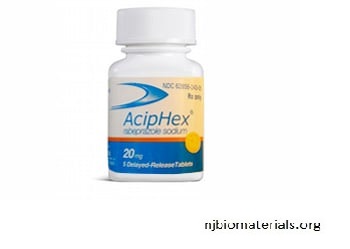Aciphex (Rabeprazole Sodium)
What is Aciphex
Aciphex, known generically as Rabeprazole Sodium, is a proton pump inhibitor (PPI) used to reduce the amount of acid produced in the stomach. By decreasing stomach acid, Aciphex helps heal acid-related damage to the esophagus and stomach, prevent ulcers, and relieve symptoms such as heartburn, difficulty swallowing, and persistent cough caused by acid reflux.
It is commonly prescribed for conditions such as gastroesophageal reflux disease (GERD), Zollinger–Ellison syndrome, and for the healing and maintenance of erosive esophagitis. Aciphex is usually taken once daily, with or without food, and is available in delayed-release tablets. Treatment does not cure the underlying cause but effectively manages symptoms and prevents complications.
Recommendations
Aciphex is recommended in the following situations:
• GERD (acid reflux disease), both short-term relief and long-term management;
• Erosive esophagitis, to heal and maintain healing of esophageal damage;
• Zollinger–Ellison syndrome, a condition with excessive stomach acid production;
• Duodenal ulcers, as part of therapy;
• Helicobacter pylori eradication therapy, in combination with antibiotics.
The dosage varies based on the condition. For most adults with GERD, the usual dose is 20 mg once daily. For Zollinger–Ellison syndrome, higher doses may be required under medical supervision. Treatment duration may range from several weeks to long-term use in chronic conditions.

Precautions and Contraindications
Although Aciphex is generally safe, it is not suitable for everyone. It should not be used in patients with:
• Known hypersensitivity to rabeprazole, other PPIs, or substituted benzimidazoles;
• Severe liver disease without careful monitoring;
• Pregnancy and breastfeeding, unless clearly necessary;
• History of osteoporosis or fractures, as long-term use may increase fracture risk;
• Risk of low magnesium levels (hypomagnesemia).
Prolonged use may also be associated with vitamin B12 deficiency or kidney issues, so monitoring is important during extended therapy.
Interactions
Aciphex can interact with other medications, altering effectiveness or increasing side effects. Important interactions include:
• Warfarin: may increase bleeding risk;
• Methotrexate: levels may rise, increasing toxicity risk;
• HIV medications (atazanavir, nelfinavir): reduced absorption, making them less effective;
• Ketoconazole or itraconazole: decreased absorption due to reduced stomach acidity;
• Digoxin: absorption may be increased, raising risk of side effects;
• Clopidogrel: potential reduction in antiplatelet effect.
Always inform your healthcare provider of all medications and supplements you are taking before starting Aciphex.
Side Effects
Like all medications, Aciphex might cause side effects if misused.
Common side effects include:
• Headache;
• Diarrhea;
• Nausea;
• Abdominal pain;
• Constipation.
Less common but more serious side effects are:
• Severe allergic reactions (rash, swelling, difficulty breathing);
• Low magnesium (causing muscle cramps, seizures, irregular heartbeat);
• Kidney problems (changes in urination, blood in urine);
• Increased risk of bone fractures with long-term use;
• Clostridioides difficile–associated diarrhea.
Seek immediate medical attention if you experience severe stomach pain, persistent diarrhea, seizures, or signs of an allergic reaction.
Overdose
An overdose of Aciphex is rare but can cause significant symptoms. Possible signs include:
• Severe headache;
• Confusion;
• Rapid heartbeat;
• Nausea and vomiting;
• Drowsiness.
If an overdose is suspected, emergency medical attention is necessary. Treatment is supportive, as there is no specific antidote. Patients may require monitoring of vital signs, hydration, and management of symptoms.